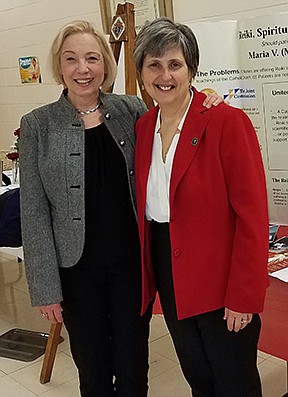Retreatants hear how hatred, resentment can be obstacle to healing
July 29, 2019 at 12:37 p.m.

By David Karas | Correspondent
Faithful who attended a March 3 “Divine Mercy” program in St. John Neumann Church, Mount Laurel, heard from a pair of speakers who focused on helping attendees answer a thought-provoking question: “Why am I not healed?”
The annual Day of Reconciliation was facilitated by Maria Arvonio, a registered nurse and the northeast regional representative for the National Association of Catholic Nurses USA, who also has experience serving on a Catholic hospital’s ethics committee.
The program – which drew more than 60 participants, including some nurses – featured Mass and Adoration of the Blessed Sacrament, as well as recitation of the Rosary and the Divine Mercy Chaplet, not to mention several sessions and talks with opportunities for questions and answers.
“The topic of discussion at the retreat is one that touches all ages since it involves both health care and healing,” Arvonio said, acknowledging some reasons healing might not take place.
“There are various reasons why we may not see the healing we yearn for, such as un-forgiveness, hatred, resentment – basically sin,” she said. “Yet, it is true that some, like saints before us, may just be suffering souls who, out of love of God, offer their suffering as a means of reparation to the Lord.”
Arvonio, who works in clinical nursing, emphasized the counsel of Pope Francis, who encouraged all to seek a spiritual director who could help faithful to discern along their individual journeys.
The retreat also included a special guest – journalist and author Susan Brinkmann, who frequently appears on the Eternal Word Television Network (EWTN) – who Arvonio said “did a fantastic job.”
Both Arvonio and Brinkmann spoke to participants about some forms of therapy that might “cause barriers to our healing” in a spiritual sense, citing methods that some describe as “holistic.”
“My prayer is that after this retreat, through the speakers’ presentations, [the] offering of the Sacrament of Reconciliation, private prayer time before a life-sized image of the Divine Mercy, Adoration and the recitation of the holy Rosary and the Divine Mercy Chaplet, participants will gain a new perspective on the issue of healing,” Arvonio said.
Reactions from participants during the retreat, Arvonio recounted, included phrases like “I never knew.” Indeed, she said, awareness is not as common as many would hope.
Arvonio, a Catholic nurse ethicist, added that she encourages hospitals and wellness centers to adopt a spiritual consent form to better inform patients.
“I pray The Divine Mercy will work through me and Susan Brinkman to inform [attendees] of the dangers and risk of utilizing health care therapies, which can actually be a barrier versus a pathway toward one’s healing,” she added.
[[In-content Ad]]
Related Stories
Sunday, December 14, 2025
E-Editions
Events
By David Karas | Correspondent
Faithful who attended a March 3 “Divine Mercy” program in St. John Neumann Church, Mount Laurel, heard from a pair of speakers who focused on helping attendees answer a thought-provoking question: “Why am I not healed?”
The annual Day of Reconciliation was facilitated by Maria Arvonio, a registered nurse and the northeast regional representative for the National Association of Catholic Nurses USA, who also has experience serving on a Catholic hospital’s ethics committee.
The program – which drew more than 60 participants, including some nurses – featured Mass and Adoration of the Blessed Sacrament, as well as recitation of the Rosary and the Divine Mercy Chaplet, not to mention several sessions and talks with opportunities for questions and answers.
“The topic of discussion at the retreat is one that touches all ages since it involves both health care and healing,” Arvonio said, acknowledging some reasons healing might not take place.
“There are various reasons why we may not see the healing we yearn for, such as un-forgiveness, hatred, resentment – basically sin,” she said. “Yet, it is true that some, like saints before us, may just be suffering souls who, out of love of God, offer their suffering as a means of reparation to the Lord.”
Arvonio, who works in clinical nursing, emphasized the counsel of Pope Francis, who encouraged all to seek a spiritual director who could help faithful to discern along their individual journeys.
The retreat also included a special guest – journalist and author Susan Brinkmann, who frequently appears on the Eternal Word Television Network (EWTN) – who Arvonio said “did a fantastic job.”
Both Arvonio and Brinkmann spoke to participants about some forms of therapy that might “cause barriers to our healing” in a spiritual sense, citing methods that some describe as “holistic.”
“My prayer is that after this retreat, through the speakers’ presentations, [the] offering of the Sacrament of Reconciliation, private prayer time before a life-sized image of the Divine Mercy, Adoration and the recitation of the holy Rosary and the Divine Mercy Chaplet, participants will gain a new perspective on the issue of healing,” Arvonio said.
Reactions from participants during the retreat, Arvonio recounted, included phrases like “I never knew.” Indeed, she said, awareness is not as common as many would hope.
Arvonio, a Catholic nurse ethicist, added that she encourages hospitals and wellness centers to adopt a spiritual consent form to better inform patients.
“I pray The Divine Mercy will work through me and Susan Brinkman to inform [attendees] of the dangers and risk of utilizing health care therapies, which can actually be a barrier versus a pathway toward one’s healing,” she added.
[[In-content Ad]]










